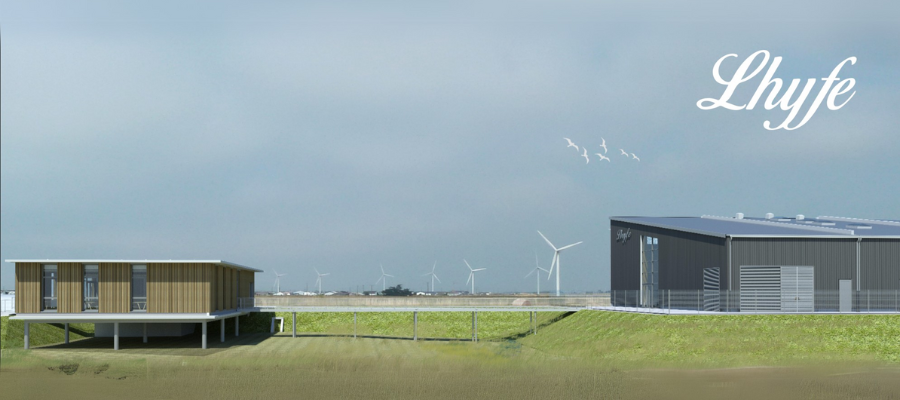🕒 Article read time: 3 minutes
Driving the Future of Logistics with Green Hydrogen: A Game-Changer for the UK Sector
Sponsored content

By Boris Davis, Head of Business Development, UK, Lhyfe.
As the world races to combat climate change, the logistics sector faces mounting pressure to decarbonise. For the UK, achieving the ambitious target of net-zero carbon emissions by 2050 requires bold innovation and investment in alternative energy sources. One such solution is green hydrogen, a promising technology poised to revolutionise logistics operations where electrification falls short.
Why Green Hydrogen?
Green hydrogen is produced through electrolysis powered by renewable energy, resulting in a near-zero carbon fuel. Unlike battery-electric vehicles (BEVs), which are limited by charging times and range, hydrogen-powered trucks offer rapid refuelling and extended range, making them ideal for heavy-duty, long-haul operations. For logistics companies grappling with high energy demands and around-the-clock operations, hydrogen provides a compelling alternative to conventional fossil fuels.
The practicality of green hydrogen is evident in its ability to address challenges faced by logistics operations that cannot electrify due to infrastructure constraints or intensive usage patterns. Hydrogen enables fleets to transition toward sustainability without compromising efficiency.

The Wallsend Project: Pioneering Green Hydrogen in Action
In Wallsend, we are leading an ambitious initiative to integrate green hydrogen into the UK’s logistics ecosystem. Pending government funding under the Hydrogen Allocation Round (HAR), we plan to build a 20MW production plant capable of generating up to eight tonnes of hydrogen daily. This facility is designed to supply half the output to a neighbouring industrial user with the remainder available to a local haulier whose operations are unsuitable for battery-electric solutions.
This project illustrates how localised hydrogen ecosystems can meet the specific demands of the logistics sector and bridge the gap between renewable energy generation and sustainable operations.
Dispelling Misconceptions
Despite its promise, green hydrogen often faces scepticism. Critics point to its perceived inefficiency, high costs, and limited infrastructure. However, advancements in production technologies and increasing government support are addressing these challenges:
1. Efficiency: Modern electrolysis methods are achieving efficiencies of up to 80%. While energy losses exist during compression and storage, the operational benefits for heavy-duty logistics outweigh these concerns.
2. Infrastructure: The UK government’s hydrogen strategy, targeting 10GW of production capacity by 2030, includes substantial investment in refuelling infrastructure. Projects like Wallsend demonstrate that localised hydrogen ecosystems can effectively meet demand.
3. Cost: Early adoption carries a premium, but economies of scale and growing renewable energy capacity are steadily reducing production costs. Subsidies under HAR will further enhance the economic feasibility of hydrogen projects.
Industry Collaboration is Key
To unlock hydrogen’s full potential, collaboration across the logistics ecosystem is essential. Vehicle manufacturers, energy producers, and logistics operators must work together to standardise technologies and ensure seamless integration into existing operations.
The Wallsend project exemplifies this synergy, with plans to transport hydrogen directly to an operator’s depot for refuelling. Plus, this model can scale, paving the way for broader adoption.
Seizing the Opportunity
For UK logistics companies, the shift to green hydrogen represents a step toward sustainability and a strategic advantage. Early adopters can position themselves as leaders in the green transition, capitalising on government incentives and meeting growing demand for eco-conscious practices.
We believe green hydrogen is not just an alternative fuel but the cornerstone of a decarbonised logistics future. By embracing this technology, the sector can drive meaningful change while ensuring its resilience in an evolving energy landscape.
The time to act is now. Logistics operators across the UK are already exploring the potential of green hydrogen to future-proof their fleets while the government is carrying out hydrogen trials of its own. With government support, advancing technologies, and trailblazing projects, hydrogen is no longer a distant dream but a tangible reality for sustainable transport.
Links:
Find out more about Lhyfe
Green hydrogen in North East, United Kingdom: Lhyfe Wallsend
About green hydrogen: From renewable hydrogen to carbon-hydrogen
About our UK plant: Lhyfe launches its first UK project with plans for 20MW green hydrogen plant
Published On: 04/02/2025 10:17:23
